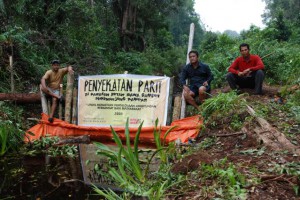Environmental advocates, especially those of us who grew up in the dam ridden West, would never imagine that a dam can actually be a tool to protect a critically threatened ecosystem. But that is exactly what is happening in the Kampar Peninsula of Sumatra, Indonesia.
The Kampar Peninsula is under attack from the pulp and paper industry, led by industry giants Asian Pulp and Paper (APP) and Asia Pacific Resources International Holdings Limited (APRIL). Rhett Butler and Chris Lang have published some detailed stories of these companies’ destructive practices HERE and HERE, respectively, on their sites.
APP and APRIL’s actions have severe consequences on biodiversity, as does all tropical forest destruction. Perhaps less recognized are the threats to global climate stability. By draining massive areas of peat forests on the Kampar Peninsula, these companies are releasing more global warming causing carbon than any other comparable activity.
Built up over hundreds of thousands of years, these forests sit on a dome of collected organic matter that can be up to 50 feet deep. Normally, this rich peat is submerged by the acidic water table, locking in the carbon and preventing decomposition. But the pulp and paper companies are constructing giant grids of canals to to drain the peat forests. As these forests dry up they release thousands of years worth of stored carbon, emitting more carbon per area than any other ecosystem, and pushing Indonesia to be the world’s third largest carbon emitter.

This month, the community of Teluk Meranti on the Kampar Peninsula has constructed a series of dams across the canals constructed by APRIL in the community’s forest. Risking arrest, intimidation, and violence, the community has taken steps to preserve the peat forest that they depend on for survival.
The world’s scientists and politicians are in a perfect storm of debate on how best to reduce global warming. Many look at the 20% of global carbon emissions emanating from tropical deforestation as cost effect area to slow the heating of the world’s climate. Mechanisms and markets for forest carbon and Reduced Emissions through Avoided Deforestation and Degradation (REDD) have emerged.
But while ‘carbon cowboys’ sell millions of dollars in fake carbon credits in Papua New Guinea and international forest carbon negotiators hold round after round of talks with no clear progress, the community of Teluk Meranti is preventing climate change with a few machetes and a plastic tarp. Sure, dams can be good for the environment too.
David Gilbert is a Research Fellow at RAN. He has worked in the tropical forests of the Amazon and Indonesia, with a special focus on forest conservation and indigenous rights.